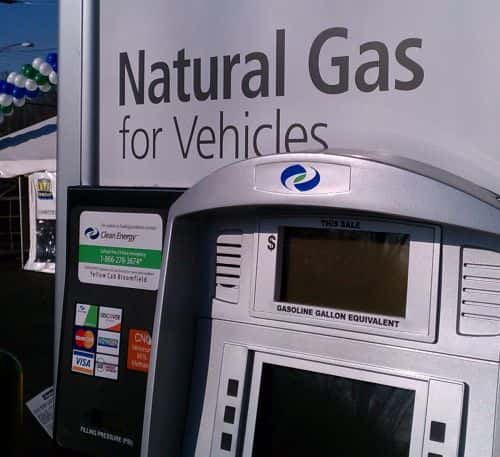 In 2004, the Commonwealth of Pennsylvania adopted California Air Resources Board (CARB) vehicle emission standards for heavy-duty trucks (beginning with the 2005 model year), defined as vehicles rated at over 14,000 lbs. gross vehicle weight. Passenger cars and light-duty trucks (
In 2004, the Commonwealth of Pennsylvania adopted California Air Resources Board (CARB) vehicle emission standards for heavy-duty trucks (beginning with the 2005 model year), defined as vehicles rated at over 14,000 lbs. gross vehicle weight. Passenger cars and light-duty trucks (
In short, vehicles rated below 8,500 lbs. or above 14,000 lbs. GVW must meet CARB standards. All other vehicles – including converted alternative fuel vehicles – must meet U.S. Environmental Protection Agency (EPA) emissions standards. Also, Pennsylvania does list a number of exceptions to the CARB standards, based on off-road use, emergency vehicles, military vehicles and other special circumstances, which are identical to exemptions allowed by CARB.
In Pennsylvania, CARB standards apply to new vehicles, which are defined as those with less than 7,500 miles on the odometer. Vehicles with more mileage are covered under EPA regulations.
Late in 2011, Pennsylvania developed a policy document to encourage more alternative fuel conversions. This was done in response to public interest in natural gas vehicles (NGVs), prompted by particularly low local pricing for natural gas as a result of the Marcellus Shale exploration and extraction.
Pennsylvania had not adopted California Code of Regulations section 2030, which relates to after-market conversion systems for alternative fuels. As a result, the Pennsylvania Department of Environmental Protection (DEP) determined that after-market natural gas conversion kits for light-duty trucks and cars must have either CARB or EPA certification.
A vehicle conversion would be valid if it was certified via the EPA and not by CARB, or vice versa. This was intended to open the market for more conversion kits and engines, whose manufacturers may not have had the funds to certify their technologies through both regulators.
Heavy-duty vehicles operate under similar regulations. New vehicles require CARB-approved systems, and vehicles with more than 7,500 miles require EPA or CARB certification.
All newly titled heavy-duty and light-duty vehicles in Pennsylvania must be CARB-certified, so new NGVs will need to be CARB-certified. This probably poses few problems, because new NGVs will generally come from OEMs that must certify the vehicles in order to sell them.
For medium-duty vehicles, there are presently no specific regulations, so only EPA certification is required.
Conversion kits for vehicles with over 7,500 miles may be either CARB- or EPA-certified. In addition, all new heavy-duty and light-duty vehicles titled in Pennsylvania must have CARB certification for the engine technology specifically
Certification is required for new vehicles to obtain a Pennsylvania title regardless of whether or not they were previously titled in another state. This rule also applies to new vehicles that have been converted to natural gas – they must obtain a new title and meet CARB requirements.
Although emissions regulations are handled by the state DEP, the Pennsylvania Department of Transportation oversees other regulations with respect to motor vehicles, including titling and vehicle safety inspection. Pennsylvania does not typically require retitling for vehicles that undergo engine repairs or changes. However, alt-fuel conversions – including those for natural gas systems – are considered significant enough to be considered a ‘rebuilding’ of the vehicle and, therefore, require a new title.
This new title is referred to as a ‘modified title.’ Owners must apply for permits to obtain modified titles, and modified-title vehicles must undergo a different inspection process. So, under these circumstances, adherence to certification requirements is likely to be more of an issue These inspections must also be performed at inspection stations that are certified for modified-title vehicles – and only a fraction of stations are certified.
So far, there have been no reports of difficulties in these processes, but issues may arise as more alt-fuel conversions are made and more vehicles are inspected and titled. Also, Pennsylvania does not relax its titling requirements as a vehicle ages – many other states do. In turn, most titling regulations will fully apply to any vehicle that requires one.
The EPA enforces anti-tampering regulations, but states are responsible for enforcing titling requirements, including ensuring CARB compliance and obtaining modified titles for converted vehicles. But for the most part, states have not rigorously checked engine modifications of any kind against EPA and CARB certifications, so uncertified conversions have been made and are in use throughout the U.S.
Based on the number of certified systems, the percentage of uncertified conversions is probably relatively high. Part of this is due to the rarity of these conversions, particularly with respect to other inspection issues. However, as natural gas and other alt-fuel conversions gain popularity, enforcement will become a more significant issue.
In fact, with media and public attention on alt-fuel conversions, some states have already issued letters and memoranda clarifying their positions and directing enforcement officers to obtain certification documentation on conversions and alterations. Pennsylvania is among those states.
Brian Krier is the energy programs manager at Ben Franklin Technology Partners of Central and Northern Pennsylvania. This article is an excerpt from a new white paper – ‘Regulatory Hurdles for Natural Gas Vehicles’ – from The Ben Franklin Shale Gas Innovation and Commercialization Center:Â The full work is available HERE.






